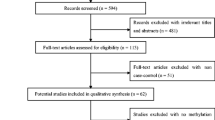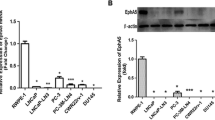Abstract
Emerging evidence has suggested that −160C/A polymorphism and promoter methylation of E-cadherin gene may contribute to the risk of prostate cancer. However, the results are still conflicting. We aim to systematically evaluate the potential of promoter methylation and polymorphism in E-cadherin gene to confer a risk to prostate cancer through meta-analysis. PubMed, Embase, Web of Science, Cochrane Library, and Chinese National Knowledge Infrastructure (CNKI) databases were searched to identify eligible studies published before April 1, 2014. Pooled odds ratios (ORs) with their 95 % confidence intervals (95 % CIs) were calculated by using the random-effect model or the fixed-effect model, according to heterogeneity test. Subgroup analyses were also performed to explore the potential sources of heterogeneity. Sensitivity and publication bias analyses were used to test the robustness of our results. We performed a meta-analysis of 22 included studies, with 11 on −160C/A polymorphism and another 11 on promoter methylation of E-cadherin gene. Our meta-analysis results suggested that E-cadherin −160C/A polymorphism may be a potential risk factor for prostate cancer. Furthermore, we observed that the frequencies of promoter methylation of E-cadherin gene in the prostate cancer tissues were significantly higher than those of normal tissues, indicating that promoter methylation of E-cadherin gene may play an important role in prostate carcinogenesis. In conclusion, the present meta-analysis provides further evidence that promoter methylation and −160C/A polymorphism of E-cadherin gene may confer a risk to prostate cancer. Identifying these risk factors for prostate cancer will improve early detection, allow for selective chemoprevention, and provide further insights into its disease mechanisms.





Similar content being viewed by others
References
Jemal A, Bray F, Center MM, Ferlay J, Ward E, Forman D. Global cancer statistics. CA Cancer J Clin. 2011;61:69–90.
Siegel R, Naishadham D, Jemal A. Cancer statistics, 2012. CA Cancer J Clin. 2012;62:10–29.
Filella X, Alcover J, Molina R. Active surveillance in prostate cancer: the need to standardize. Tumour Biol. 2011;32:839–43.
Wong YN, Mitra N, Hudes G, Localio R, Schwartz JS, Wan F, et al. Survival associated with treatment vs observation of localized prostate cancer in elderly men. JAMA. 2006;296:2683–93.
Gotay CC, Holup JL, Pagano I. Ethnic differences in quality of life among early breast and prostate cancer survivors. Psychooncology. 2002;11:103–13.
Gronberg H. Prostate cancer epidemiology. Lancet. 2003;361:859–64.
Sankpal UT, Pius H, Khan M, Shukoor MI, Maliakal P, Lee CM, et al. Environmental factors in causing human cancers: emphasis on tumorigenesis. Tumour Biol. 2012;33:1265–74.
Thomas G, Jacobs KB, Yeager M, Kraft P, Wacholder S, Orr N, et al. Multiple loci identified in a genome-wide association study of prostate cancer. Nat Genet. 2008;40:310–5.
Zheng SL, Sun J, Wiklund F, Smith S, Stattin P, Li G, et al. Cumulative association of five genetic variants with prostate cancer. N Engl J Med. 2008;358:910–9.
Hunter DJ, Riboli E, Haiman CA, Albanes D, Altshuler D, Chanock SJ, et al. A candidate gene approach to searching for low-penetrance breast and prostate cancer genes. Nat Rev Cancer. 2005;5:977–85.
Shields PG, Harris CC. Cancer risk and low-penetrance susceptibility genes in gene–environment interactions. J Clin Oncol. 2000;18:2309–15.
Berx G, Becker KF, Hofler H, van Roy F. Mutations of the human E-cadherin (CDH1) gene. Hum Mutat. 1998;12:226–37.
More H, Humar B, Weber W, Ward R, Christian A, Lintott C, et al. Identification of seven novel germline mutations in the human E-cadherin (CDH1) gene. Hum Mutat. 2007;28:203.
Kuefer R, Hofer MD, Gschwend JE, Pienta KJ, Sanda MG, Chinnaiyan AM, et al. The role of an 80 kDa fragment of E-cadherin in the metastatic progression of prostate cancer. Clin Cancer Res. 2003;9:6447–52.
Onder TT, Gupta PB, Mani SA, Yang J, Lander ES, Weinberg RA. Loss of E-cadherin promotes metastasis via multiple downstream transcriptional pathways. Cancer Res. 2008;68:3645–54.
Wijnhoven BP, Dinjens WN, Pignatelli M. E-cadherin–catenin cell–cell adhesion complex and human cancer. Br J Surg. 2000;87:992–1005.
Boggon TJ, Murray J, Chappuis-Flament S, Wong E, Gumbiner BM, Shapiro L. C-cadherin ectodomain structure and implications for cell adhesion mechanisms. Science. 2002;296:1308–13.
Baranwal S, Alahari SK. Molecular mechanisms controlling E-cadherin expression in breast cancer. Biochem Biophys Res Commun. 2009;384:6–11.
Chen B, Zhou Y, Yang P, Liu L, Qin XP, Wu XT. CDH1–160C > A gene polymorphism is an ethnicity-dependent risk factor for gastric cancer. Cytokine. 2011;55:266–73.
von Burstin J, Eser S, Paul MC, Seidler B, Brandl M, Messer M, et al. E-cadherin regulates metastasis of pancreatic cancer in vivo and is suppressed by a SNAIL/HDAC1/HDAC2 repressor complex. Gastroenterology. 2009;137:361–71, 71 e1–5.
Jonsson BA, Adami HO, Hagglund M, Bergh A, Goransson I, Stattin P, et al. −160C/A polymorphism in the E-cadherin gene promoter and risk of hereditary, familial and sporadic prostate cancer. Int J Cancer. 2004;109:348–52.
Li LC, Chui RM, Sasaki M, Nakajima K, Perinchery G, Au HC, et al. A single nucleotide polymorphism in the E-cadherin gene promoter alters transcriptional activities. Cancer Res. 2000;60:873–6.
Kallakury BV, Sheehan CE, Winn-Deen E, Oliver J, Fisher HA, Kaufman Jr RP, et al. Decreased expression of catenins (alpha and beta), p120 CTN, and E-cadherin cell adhesion proteins and E-cadherin gene promoter methylation in prostatic adenocarcinomas. Cancer. 2001;92:2786–95.
Little J, Higgins JP, Ioannidis JP, Moher D, Gagnon F, von Elm E, et al. Strengthening the reporting of genetic association studies (STREGA): an extension of the STROBE statement. Hum Genet. 2009;125:131–51.
Teo YY, Fry AE, Clark TG, Tai ES, Seielstad M. On the usage of HWE for identifying genoty** errors. Ann Hum Genet. 2007;71:701–3. author reply 4.
Higgins JP, Thompson SG. Quantifying heterogeneity in a meta-analysis. Stat Med. 2002;21:1539–58.
Jackson D, White IR, Riley RD. Quantifying the impact of between-study heterogeneity in multivariate meta-analyses. Stat Med. 2012;31:3805–20.
Sacks HS, Berrier J, Reitman D, Ancona-Berk VA, Chalmers TC. Meta-analyses of randomized controlled trials. N Engl J Med. 1987;316:450–5.
Egger M, Davey Smith G, Schneider M, Minder C. Bias in meta-analysis detected by a simple, graphical test. BMJ. 1997;315:629–34.
Peters JL, Sutton AJ, Jones DR, Abrams KR, Rushton L. Comparison of two methods to detect publication bias in meta-analysis. JAMA. 2006;295:676–80.
Bonilla C, Mason T, Long L, Ahaghotu C, Chen W, Zhao A, et al. E-cadherin polymorphisms and haplotypes influence risk for prostate cancer. Prostate. 2006;66:546–56.
Cybulski C, Wokolorczyk D, Jakubowska A, Gliniewicz B, Sikorski A, Huzarski T, et al. DNA variation in MSR1, RNASEL and E-cadherin genes and prostate cancer in Poland. Urol Int. 2007;79:44–9.
Forszt P, Pilecka A, Malodobra M, Markowska J, Maksymowicz K, Dobosz T. Single-nucleotide polymorphism association study of VDR and CDH1 genes and the risk of prostate cancer. Adv Clin Exp Med. 2009;18:215–20.
Goto T, Nakano M, Ito S, Ehara H, Yamamoto N, Deguchi T. Significance of an E-cadherin gene promoter polymorphism for risk and disease severity of prostate cancer in a Japanese population. Urology. 2007;70:127–30.
Hajdinjak T, Toplak N. E-cadherin polymorphism— − 160 C/A and prostate cancer. Int J Cancer. 2004;109:480–1.
Kamoto T, Isogawa Y, Shimizu Y, Minamiguchi S, Kinoshita H, Kakehi Y, et al. Association of a genetic polymorphism of the E-cadherin gene with prostate cancer in a Japanese population. Jpn J Clin Oncol. 2005;35:158–61.
Lindstrom S, Wiklund F, Jonsson BA, Adami HO, Balter K, Brookes AJ, et al. Comprehensive genetic evaluation of common E-cadherin sequence variants and prostate cancer risk: strong confirmation of functional promoter SNP. Hum Genet. 2005;118:339–47.
Pookot D, Li LC, Tabatabai ZL, Tanaka Y, Greene KL, Dahiya R. The E-cadherin −160 C/A polymorphism and prostate cancer risk in white and black American men. J Urol. 2006;176:793–6.
Tsukino H, Kuroda Y, Imai H, Nakao H, Qiu D, Komiya Y, et al. Lack of evidence for the association of E-cadherin gene polymorphism with increased risk or progression of prostate cancer. Urol Int. 2004;72:203–7.
Verhage BA, van Houwelingen K, Ruijter TE, Kiemeney LA, Schalken JA. Single-nucleotide polymorphism in the E-cadherin gene promoter modifies the risk of prostate cancer. Int J Cancer. 2002;100:683–5.
Hoque MO, Topaloglu O, Begum S, Henrique R, Rosenbaum E, Van Criekinge W, et al. Quantitative methylation-specific polymerase chain reaction gene patterns in urine sediment distinguish prostate cancer patients from control subjects. J Clin Oncol. 2005;23:6569–75.
Li C, Zhang X, Chen Z, Ouyang J, Du G, Yang W, et al. A specific methylation pattern of the E-cadherin gene promoter is associated with its expression and the pathological grades in prostate cancer. Chin J Exp Surg. 2000;17:47–8.
Li LC, Zhao H, Nakajima K, Oh BR, Ribeiro Filho LA, Carroll P, et al. Methylation of the E-cadherin gene promoter correlates with progression of prostate cancer. J Urol. 2001;166:705–9.
Maruyama R, Toyooka S, Toyooka KO, Virmani AK, Zochbauer-Muller S, Farinas AJ, et al. Aberrant promoter methylation profile of prostate cancers and its relationship to clinicopathological features. Clin Cancer Res. 2002;8:514–9.
Singal R, Ferdinand L, Reis IM, Schlesselman JJ. Methylation of multiple genes in prostate cancer and the relationship with clinicopathological features of disease. Oncol Rep. 2004;12:631–7.
Tilandyova P, Grobarcikova S, Kajo K, Kliment J, Lasabova Z, Zubor P, et al. Detection of methylation of GSTP1, E-cad and PTGS2 in prostate adenocarcinoma and benign prostate hyperplasia. European Urology. 2010;Supplement 9:626–7.
Tong Q, Qiu J, Yao L, Huang J, Liu J, Sun R, et al. Pyrosequencing detection of aberrant methylation of GSTP1, CDH1 and p16 genes in prostate cancer. Chin J Med Off. 2013;41:577–9.
Vasiljevic N, Wu K, Brentnall AR, Kim DC, Thorat MA, Kudahetti SC, et al. Absolute quantitation of DNA methylation of 28 candidate genes in prostate cancer using pyrosequencing. Dis Markers. 2011;30:151–61.
Woodson K, Hanson J, Tangrea J. A survey of gene-specific methylation in human prostate cancer among black and white men. Cancer Lett. 2004;205:181–8.
Yao Q, He XS, Zhang JM, He J. Promotor hypermethylation of E-cadherin, p16 and estrogen receptor in prostate carcinoma. Zhonghua Nan Ke Xue. 2006;12:28–31.
Abate-Shen C, Shen MM. Molecular genetics of prostate cancer. Genes Dev. 2000;14:2410–34.
Shen MM, Abate-Shen C. Molecular genetics of prostate cancer: new prospects for old challenges. Genes Dev. 2010;24:1967–2000.
Wang GY, Lu CQ, Zhang RM, Hu XH, Luo ZW. The E-cadherin gene polymorphism 160C → A and cancer risk: a HuGE review and meta-analysis of 26 case–control studies. Am J Epidemiol. 2008;167:7–14. doi:10.1093/aje/kwm264.
Wang L, Wang G, Lu C, Feng B, Kang J. Contribution of the −160C/A polymorphism in the E-cadherin promoter to cancer risk: a meta-analysis of 47 case–control studies. PLoS One. 2012;7:e40219. doi:10.1371/journal.pone.0040219.
Qiu LX, Li RT, Zhang JB, Zhong WZ, Bai JL, Liu BR, et al. The E-cadherin (CDH1)— − 160 C/A polymorphism and prostate cancer risk: a meta-analysis. Eur J Hum Genet. 2009;17:244–9. doi:10.1038/ejhg.2008.157.
Deng QW, He BS, Pan YQ, Sun HL, Xu YQ, Gao TY, et al. Roles of E-cadherin (CDH1) genetic variations in cancer risk: a meta-analysis. Asian Pac J Cancer Prev. 2014;15:3705–13.
Conflicts of interest
None
Author information
Authors and Affiliations
Corresponding author
Additional information
Zheng Chang and Hongbing Zhouhave the same contributions to this study and should be considered as co-first authors
Rights and permissions
About this article
Cite this article
Chang, Z., Zhou, H. & Liu, Y. Promoter methylation and polymorphism of E-cadherin gene may confer a risk to prostate cancer: a meta-analysis based on 22 studies. Tumor Biol. 35, 10503–10513 (2014). https://doi.org/10.1007/s13277-014-2323-0
Received:
Accepted:
Published:
Issue Date:
DOI: https://doi.org/10.1007/s13277-014-2323-0




